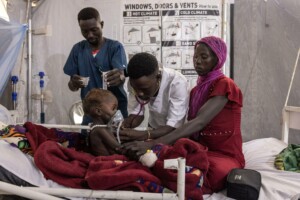Sudan OCHA bulletin 33: Raising awareness about the Darfur Hotline
The Office for the Coordination of Humanitarian Affairs (OCHA) announced in its latest weekly bulletin that it is conducting an awareness-raising campaign to promote its Darfur Hotline among the displaced in eight camps across North Darfur.
OCHA also reports that the large influx of South Sudanese refugees is over-stretching the already limited humanitarian resources and funding.
The late rainfall in Central Darfur increases the demands for humanitarian aid. Torrents in Blue Nile state destroyed more than 500 houses.
The Office for the Coordination of Humanitarian Affairs (OCHA) announced in its latest weekly bulletin that it is conducting an awareness-raising campaign to promote its Darfur Hotline among the displaced in eight camps across North Darfur.
OCHA also reports that the large influx of South Sudanese refugees is over-stretching the already limited humanitarian resources and funding.
The late rainfall in Central Darfur increases the demands for humanitarian aid. Torrents in Blue Nile state destroyed more than 500 houses.
The Darfur Hotline is a tool designed to identify and respond to gaps in existing camp services by bridging mobile phone communication between the camp populations and humanitarian organisations, OCHA explains in its latest bulletin. It is only meant for reporting new gaps caused by new arrivals or damage from natural disasters.
This camp referral system provides a more timely and accountable way to ensure the needs of camp residents are being met. Displaced people can call the hotline number free of charge, when they need to report a gap or a problem in an existing camp service regarding health, education, nutrition, water and sanitation or veterinary support. After verification, appropriate response measures will be taken.

Humanitarian support capacity over-stretched
The large and growing presence of refugees, in particular from South Sudan, is placing additional pressure on the already limited humanitarian resources and funding. The expected total number of refugees in 2015 of 196,000 has nearly been reached, OCHA reports.
As a result, figures for the remainder of the year are under revision. In addition, funding for the inter-agency response to South Sudanese refugees remains low, with only 15 per cent of funding requirements secured to date.
At least 189,000 South Sudanese refugees have fled into Sudan since the outbreak of the conflict in South Sudan in December 2013. They represent more than half of the 368,000 refugees and asylum seekers currently in Sudan, according to UNHCR figures from 31 July 2015.
There are about 112,000 refugees and asylum seekers from Eritrea, and the remainder are mainly from Ethiopia, Chad, and the Central African Republic.
Delayed rainy season in Central Darfur
Aid organisations in Central Darfur reported that, as with many other parts of the country, the late onset of the rainy season in the state has delayed and limited the period when farmers can plant their crops. As a result, the amount of land cultivated has decreased from 714,000 hectares in 2014 to 504,000 hectares in 2015.
Pest attacks (i.e. locusts and rats) further complicate the agricultural season. Consequently, this year the Food and Agricultural Organization (FAO), the International Committee of the Red Crescent (ICRC) and the Ministry of Agriculture have distributed 31 percent more seeds than in 2014 to populations in need throughout Central Darfur.
INGO hands over health services in South Darfur
The international American Refugee Committee (ARC) has phased out of some of its health activities in rural areas of South Darfur because of the presence of other health services.
A Primary Health Centre in El Salam locality was replaced by a rural hospital constructed recently by the Qatar Charity Foundation, the Reproductive Health Unit in Tullus was taken over by the Tullus rural hospital, and a mobile clinic has been handed over to the South Darfur Ministry of Health. ARC will continue to supply all three facilities with medicine until the end of the year.
Rain damages over 500 houses in Blue Nile State
On 14 August, heavy rain and floods caused damage to some 515 houses, affecting about 2,600 people in Agadi Village in Blue Nile’s Tadamon locality. The national Al Salam Organisation, the Sudanese Red Crescent Society, and the governmental Humanitarian Aid Commission distributed around 200 emergency household kits and 100 bags of sorghum to the affected families. International aid organisations have not yet been approached to conduct assessments or provide additional support.
The food security situation of an estimated 2,658 displaced families (about 13,300 people) in Ed Damazin and El Roseires localities, who were affected by continuing heavy rains in their areas of displacement is of critical concern.
Read the full bulletin here











 and then
and then